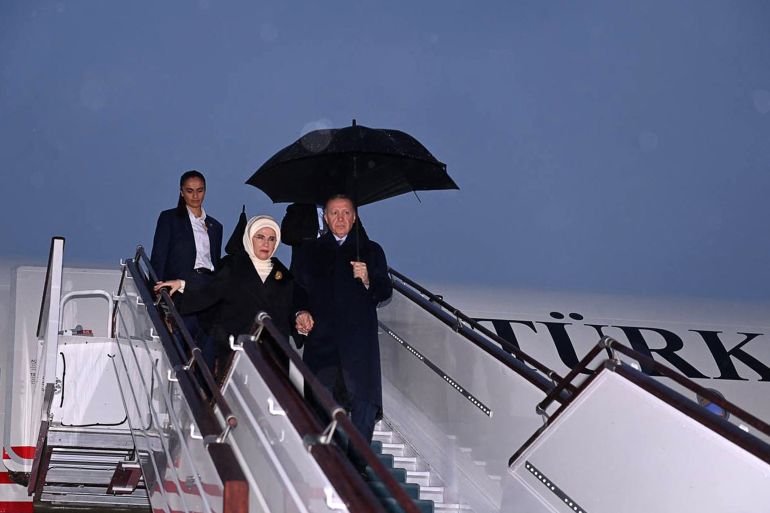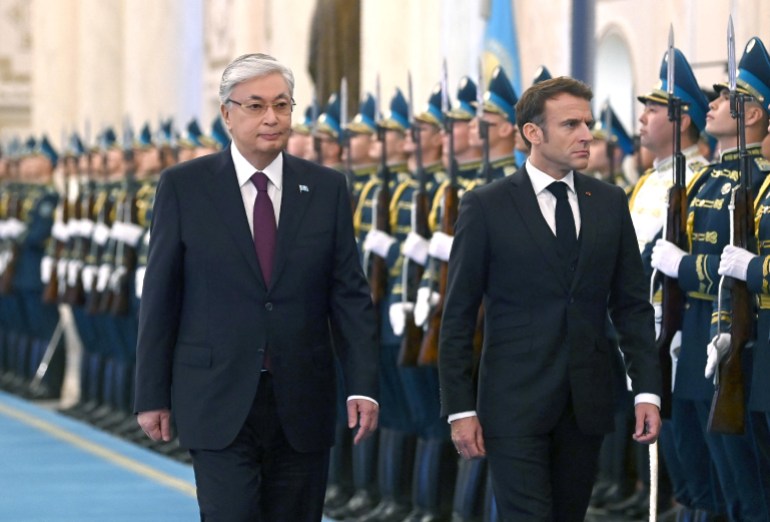Pakistan, Turkey, Iran leaders visit Central Asia in diplomatic push
Putin visits Kazakhstan while Raisi, Erdogan and Kakar are due to attend a regional economic summit in Uzbekistan.

Leaders of Russia, Turkey, Iran, and Pakistan are all making stops in Central Asia as global powers seek to expand their influence in the traditionally Russia-dominated region.
Russian President Vladimir Putin touched down in Kazakhstan’s capital Astana on Thursday morning for talks with his counterpart Kassym-Jomart Tokayev.
Keep reading
list of 4 itemsRussian official accuses West of ‘manipulation’ in Kazakhstan
Uzbekistan touts Silk Road past in bid for tourist boom
Uzbekistan presidential election: No choice amid apathy and heat
The trip comes just a week after French President Emmanuel Macron also paid a visit there, hoping to “accelerate” economic cooperation.
Meanwhile, Turkey’s leader Recep Tayyip Erdogan, Iran’s President Ebrahim Raisi, and Pakistani Prime Minister Anwaar ul Haq Kakar are visiting Uzbekistan on Thursday for a regional economic summit.
The flurry of engagement shows how the former Soviet countries are opening up to new partnerships as Russia’s grip on the region wanes.

Putin and Tokayev nevertheless praised their countries’ relationship before their planned meeting in Astana.
“Our strategic partnership is truly forward-looking,” Putin said.
Tokayev hailed an “alliance with a rich past and a bright future”.
But more than 30 years after the collapse of the Soviet Union, with Russia locked in a bloody, 20-month war with Ukraine, Kazakhstan and other Central Asian nations are eyeing partnerships with other world powers.
Jockeying for influence
China has become a key player throughout the region owing to its Belt and Road Initiative, a mammoth infrastructure development project that spans 150 countries.
The European Union, the United States, Iran and Turkey are also competing for sway in Central Asia.
Iran and Turkey are set to join Pakistan’s prime minister and Central Asian leaders for a summit of the regional Economic Cooperation Organisation in Tashkent on Thursday.
While the summit comes as the monthlong war between Israel and Palestinian group Hamas wears on, the conflict in Gaza will not be on the agenda, Uzbekistan said.
On October 7, Hamas launched a surprise attack on Israel that killed more than 1,400 people, mostly civilians, according to Israeli authorities.
Aiming to destroy Hamas, Israel responded with a relentless bombardment and ground invasion of the Gaza Strip that has killed more than 10,500 people, more than a third of them children, according to Gaza’s health officials.
Tehran, which backs Hamas, said it did want to discuss the conflict, its state-run agency IRNA said.
However, Erdogan – who has been a vocal critic of Israel and recently recalled his ambassador from Israel – is likely to broach the topic.
Strengthening trade
Most of the talks at the summit are expected to focus on trade, humanitarian cooperation, and transport.
Central Asian countries, which are landlocked, are trying to gain access to the sea, including via Pakistan.
Russia is under pressure in the region but it remains a key partner.
Moscow renewed investments in the energy sectors, having been excluded from most of the European market by sanctions triggered by the full-scale invasion of Ukraine.
It has launched huge energy projects, including launching gas supplies to Uzbekistan via Kazakhstan.
It is also discussing building nuclear power plants and hydroelectric projects in several countries.